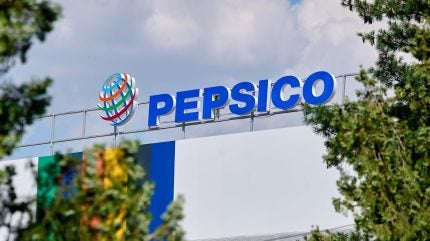
PepsiCo has today (9 October) emphasised its “portfolio reshaping” efforts for a sequential acceleration in its third-quarter reported growth and a turnaround from the decline in the same period last year.
Alongside the results, chairman and CEO Ramon Laguarta welcomed a new CFO in the form of Walmart executive Steve Schmitt, who he said will “play a crucial role as we accelerate growth”.

Discover B2B Marketing That Performs
Combine business intelligence and editorial excellence to reach engaged professionals across 36 leading media platforms.
Schmitt is set to join the US-based food and drinks giant on 10 November to replace the retiring Jamie Caulfield, a 30-year veteran of the Cheetos snacks and Gatorade beverages owner.
Pace was the theme in today’s twin announcements.
Commenting on the third-quarter figures, Laguarta said: “Our reported net revenue growth accelerated and reflects the resilience of our international business, improved momentum within North America Beverages [PBNA] and the benefits of our portfolio reshaping actions.
“As we look ahead to the balance of this year and beyond, our top priorities are to accelerate growth and aggressively optimise our cost structure.”

US Tariffs are shifting - will you react or anticipate?
Don’t let policy changes catch you off guard. Stay proactive with real-time data and expert analysis.
By GlobalDataHowever, just over a month since activist investor Elliott Management called for “a more focused, streamlined” business, PepsiCo’s volumes remained under pressure in the third quarter across food and drinks, averaged out across its reporting segments and regions.
Building on his previous remarks, Laguarta said: “To accomplish this, we are introducing a strong pipeline of innovation to accelerate portfolio transformation, continuously sharpening our price-pack architecture to provide good value to consumers, and right-sizing our entire cost base to help fund our activities.”
PepsiCo’s reported revenue growth was 2.6% in the third quarter, compared to 1% in the prior three months and a negative 0.6% at the same time last year.
In organic terms, 1.3% growth was delivered, matching the pace in the same quarter of fiscal 2024 and marking a slowdown from 2.1% in the second quarter.
The Doritos snacks and Pepsi Max soft drinks maker reiterated expectations for a low-single-digit increase in organic revenue over the full year.
Group volumes, meanwhile, fell by an average of 1% for each of PepsiCo’s convenient foods products and beverages businesses.
Breaking volumes down, PepsiCo Foods North America (PFNA) posted a 4 decline and PBNA a 3% decrease. Its international franchise drinks business saw a 1% drop.
For Europe, Middle East and Africa (EMEA), convenient foods volumes fell 1% but were up 1.5% for beverages.
In Latin America, food volumes were flat but increased 3% in Asia Pacific.
Elliott Management, which manages funds with a $4bn stake in PepsiCo, said in September that the company should weigh up the potential refranchising of its drinks bottling network in North America and review its beverage portfolio in the region to make that side of the business less complex.
In other areas of its guidance, PepsiCo kept its stance for core, constant-currency EPS to be “approximately even” with 2024.
The metric dropped 2% in the third quarter and was down 3.5% year to date. It was up 9% in the previous 12 months.
Ahead of Schmitt coming on board, Laguarta said: “Steve has a strong track record of proven results and brings critical expertise that aligns with PepsiCo’s growth strategy.
“Steve’s experience working with complex supply chains, adapting to the dynamic retail landscape and omnichannel consumers, and delivering operational excellence on a large scale will be impactful at PepsiCo.”
Laguarta added that Schmitt “will play a crucial role as we accelerate growth, optimise our cost structure, and create greater value for our shareholders”.
In a note to clients, Barclays analyst Lauren Lieberman said: “Though PepsiCo posted EPS ahead of Street estimates, aided by FX and a lower tax rate, organic volumes fell short nearly across the board, excluding EMEA.
“While we didn’t expect to see demonstrable progress this quarter, we also didn’t expect to see trends slow across the board although we would offer that this softer performance internationally (the biggest shortfall was LatAm Foods) is something likely to repeat across earnings season.”





